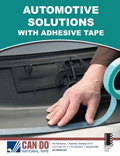
Automotive manufacturers play a significant role in achieving the goals driven by these new standards. A concerted effort is underway to decrease the weight of all vehicles, enabling them to meet U.S. current standard of 54.5 MPG. Weight reduction also optimizes performance and affordability of vehicles, and enhances the driving range of hybrid and electric vehicles.
According to Car and Driver, the new standards are expected to result in a savings of $4,000 in fuel costs over the lifetime of a vehicle. However, these savings also come at a cost:
“Government analysts expect that the incremental costs of better mileage will boost the price of an average 2016 model by $926 (over a 2011 model). “
Manufacturers of vehicles and vehicle assemblies are looking for ways to cut costs and improve efficiencies in their designs to stay competitive in this new challenging environment.
Adhesive Tapes – A Lightweight Bonding Solution
Adhesive tapes used in automotive assemblies provide a lightweight bonding method that adds practically no weight to the finished product, compared with conventional fasteners. In addition to the weight reduction advantages, tapes effectively bond both low-surface-energy and high-surface-energy materials. Custom converting options enable the die-cutting of adhesive tapesto simplify assembly and reduce waste.
To learn more about how adhesive tapes are meeting challenges in the automotive industry, download our free guide.

